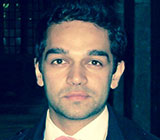 Picture the scene. It was the first day of the NHS national medical director’s clinical fellow scheme induction. A group of junior doctors, who had successfully applied to take a year out of their training programmes to develop clinical leadership skills, were sat around meeting tables, making introductions in a grand committee room in the Royal College of Physicians’ building in London.
Picture the scene. It was the first day of the NHS national medical director’s clinical fellow scheme induction. A group of junior doctors, who had successfully applied to take a year out of their training programmes to develop clinical leadership skills, were sat around meeting tables, making introductions in a grand committee room in the Royal College of Physicians’ building in London.
As we worked our way around the room, I realised it was actually quite fitting that we were sat in this college, as the group had a very physician-ly flavour to it. Every doctor knows how tribal we are about specialty groups, and I was keen, as I’m sure others were, to see the mix we had in the room.
A handful of core medical trainees introduced themselves, as did a few senior trainees in medical specialties including infectious diseases, geriatrics, and respiratory medicine. A couple of others had joined the scheme from anaesthetics, and there was representation from obstetrics and gynaecology and paediatrics. As well as a healthy psychiatry presence, there were even trainees from relatively small specialties, such as public health and neurosurgery.
Fantastic, I thought. What a diverse and interesting bunch of doctors to spend the year with. Then, all of a sudden, it dawned on me that nobody else but me had uttered those two magic words: “general practice.” My tribal tendencies kicked in and I begin to panic. This can’t be right, I thought. I couldn’t be the only one. Could I?
I soon learnt that I was, in fact, the only one. Indeed, the previous cohort of fellows had no general practice trainees at all. So, what’s going on? Why don’t we have more junior doctors from general practice on this great scheme?
The first question should probably be whether this is actually a problem at all. When considering the proportion of trainee doctors in different specialties, it’s clear that general practice makes a big slice of the junior doctor pie, and one could argue that we need these opportunities to be taken by doctors across the specialty spectrum in at least an approximately representative way.
However, there may actually be more to it than this. General practice in the UK is in a critical state, with challenges in recruitment and reorganisation part of an important national debate. Moreover, the arrival of clinical commissioning means that future general practitioners will need leadership skills more than ever. This is an important time for the specialty, and it may be the ideal time for a generation of junior doctors to develop the relevant skills to step up and lead positive change in primary care.
Having had a fantastic experience on the scheme so far, I would recommend the experience wholeheartedly and strongly encourage junior doctors to consider applying early on in their training.
Trainees in general practice have a shorter training period and will need to take the initiative to make their applications competitive. As the entry to general practice training is based on exams and not portfolios, trainees may find that their CVs are not as jam-packed as their peers who have applied to competitive hospital specialties. It is important to remember that this does not necessarily make them better suited to the role, only more naturally prepared to demonstrate interest because of the nature of their specialty applications.
General practice is an environment filled with leadership opportunities, and there’s plenty of scope to show willingness by taking roles locally with local medical committees and local education and training boards, or nationally with trainee representation committees for the British Medical Association and the Royal College of General Practitioners. Primary care is an excellent place to conduct quality improvement projects, and there are an increasing number of ways to publish and present this work.
Importantly, the clinical fellow scheme has recognised the shorter training in general practice, and has allowed those in their final year of general practice training to apply with arrangements in place to ensure that certificate of completion of training dates can be adjusted to accommodate for the additional year.
Applications for the national medical director’s clinical fellow scheme opened in December 2014, and the scheme continues to be hosted by the Faculty of Medical Leadership and Management. A series of forthcoming events and webinars will help junior doctors decide whether the scheme is for them. I encourage all junior doctors to consider taking this excellent opportunity and, in particular, I hope that there’ll be a stronger primary care representation around the table in future years. After all, nobody likes being the “odd one out.”
Ahmed Rashid is a clinical fellow on the national medical director’s clinical fellow scheme. He is based at the National Institute for Health and Care Excellence. You can follow him on Twitter @Dr_A_Rashid
I declare that I have read and understood BMJ policy on declaration of interests and I hereby declare the following interests: I am on the clinical fellow scheme mentioned in this blog.
